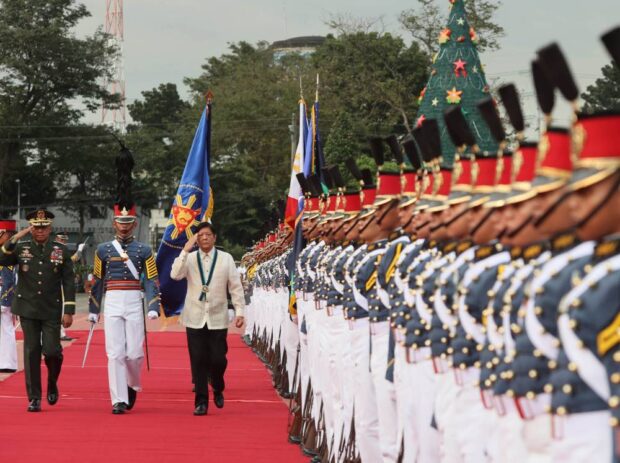
TROOPING THE LINE President Marcos leads the 88th anniversary of the Armed Forces of the Philippines on Dec. 21 at the AFP headquarters in Quezon City. —MARIANNE BERMUDEZ
Four Senate committees have recommended the establishment of separate trust funds for the retirement and pension of the military and other uniformed personnel (MUP) to make their post-employment benefits system sustainable.
Under Committee Report No. 173, the Senate panels also moved for the creation of two trust fund committees that will handle the proposed pension system for members of the Armed Forces of the Philippines (AFP) and other law enforcement agents.
Besides the AFP, those covered by the new pension system are the personnel of the Philippine National Police, Philippine Coast Guard, Bureau of Fire Protection, Bureau of Jail Management and Penology, Bureau of Corrections, and the hydrography branch of the National Mapping and Resource Information Authority.
The senators from the committees on national defense, government corporations and public enterprises, ways and means, and finance, tasked the Government Service Insurance System (GSIS) to manage both the AFP Trust Fund and the Uniformed Personnel Trust Fund.
The GSIS president was likewise designated as a member of the trust fund committees, along with the secretaries of the Department of Finance, the Department of Budget and Management, and the heads of the respective uniformed services.
Sen. Jinggoy Estrada, the chair of the Senate national defense committee, expressed confidence the proposals they had made would finally resolve the ticklish issue on the MUP pension system.
During a Senate hearing in May, Undersecretary Carlito Galvez Jr., then the officer in charge of the Department of National Defense, had warned that about 80 percent of AFP personnel might avail of early retirement to maximize their benefits before the government revises their pension system.
According to Estrada, the planned modifications in the MUP pension will not affect the current computation of the separation, retirement, pension, survivorship and other similar benefits of employees in law enforcement units.
The proposed reforms, he added, would actually raise the retirement pay of some of the pensioners by “5 percentage points.”
Estrada clarified early this month that “whatever is being enjoyed by the current pensioners and whatever is expected by those currently in the active service will still be enjoyed and received by them.”
He added that the new pension scheme would only cover those who will enter the armed services after the passage of the law.
‘Self-sufficient’
“It [is] not dependent on the government’s limited capacity to set aside funds, but one that is wholly owned by the contributing members and one that is self-sufficient,” Estrada said.
Unlike the GSIS and the Social Security System, which are primarily funded by the member-workers’ contributions, the MUP pension is fully financed by the annual national budget.
This made the retirement scheme unsustainable, with the GSIS estimating the unfunded liabilities may already reach P14.3 trillion this year.
READ: Salceda bill pushes pension reforms for uniformed services